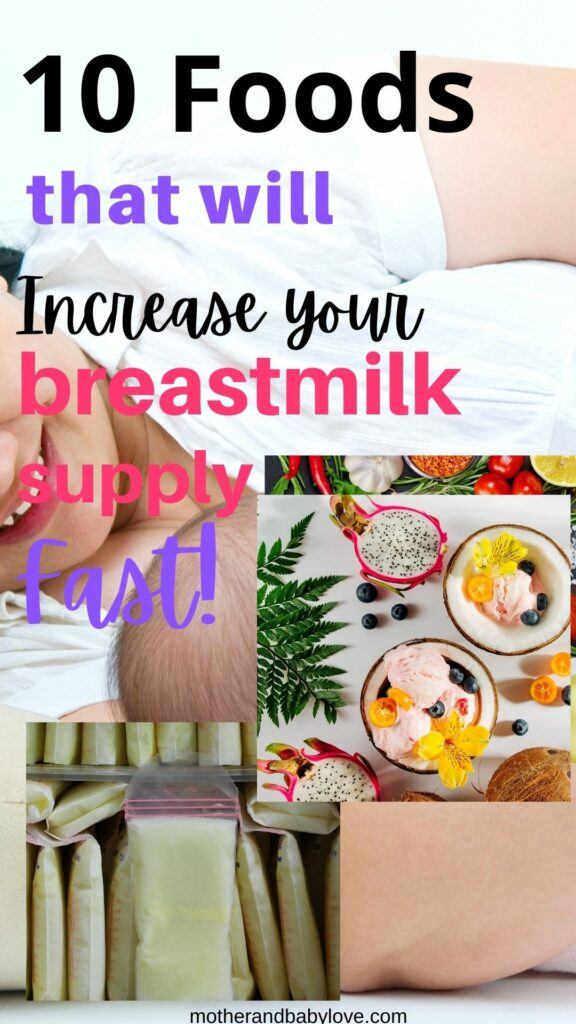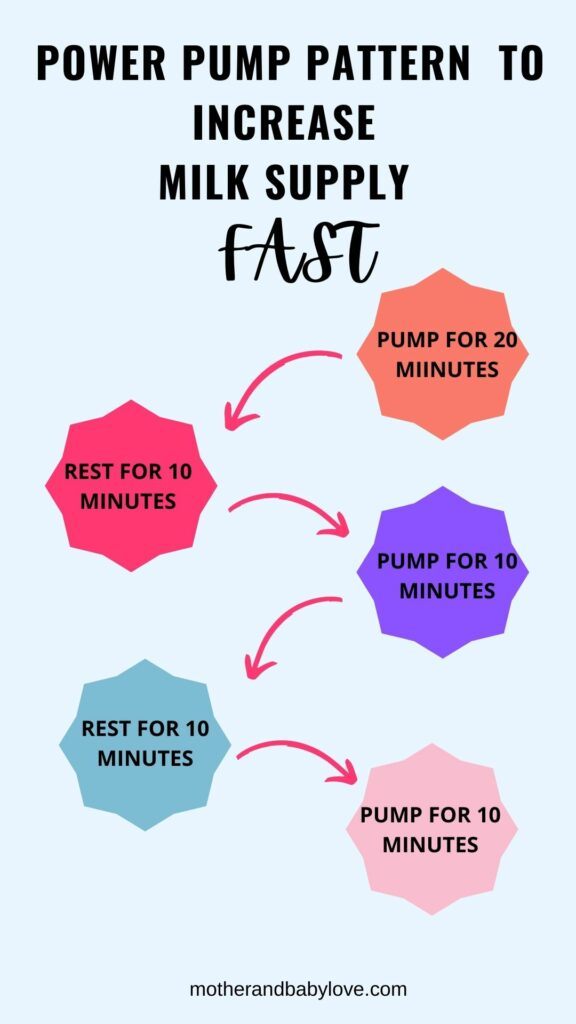
In the initial stages of caring for a breastfed child, nothing is as stressful as thinking about whether you’re producing enough milk or not. Every whimper, hiccup, or cry could make you feel like the baby isn’t getting an optimum milk supply and throw you into a panic. Sometimes all you want to know is how to increase your breast milk supply fast!
But how can you tell you tell if you truly have a low milk supply? And even more importantly, how can you increase your breastmilk supply quickly, even in a day?
You don’t need to worry, mama.
Read on and we will be helping you answer these and more questions to help you achieve your breastfeeding goals.
Related: Ultimate guide to breastfeeding for new moms | Eight Proven Benefits of Breastfeeding to Both Mother and Child
Also read: All your burning breastfeeding questions answered by a lactation counselor
Disclaimer: Some links on this page are affiliate links and as an Amazon Associate, I earn from qualifying purchases
In a hurry? Here is a quick summary of the best ways to increase milk supply fast:
- Eating a healthy anti-inflammatory diet
- Get enough rest/sleep
- Reduce stress
- Increase milk removal by breastfeeding and/or pumping often
- Power pumping
We all know that breastfeeding may be simple, but easy is not a word we can use to describe it. It is a journey that requires patience and having faith in the process.
My advice- relax, trust yourself and trust your baby. You got this!
Are you changing their wet diapers often? Do they seem satisfied after their feeding session? Are they sleeping well? Then, you’re most likely on the right path.
However, if you suspect a low milk supply, let’s look at some of the signs that your milk supply is low.
What are the Signs of Low Breast Milk Supply?
Some of the indicative signs of a low breastmilk supply include:
- Producing minimal wet diapers in a day: During the first weeks of life, the number of wet diapers changed in a day is an indicator of whether there’s enough milk supply. You should expect at least six to eight wet diapers per day.
- Poor weight gain: Although infants lose some weight after birth, if they aren’t gaining weight steadily in the first few weeks, then you need to consult a pediatrician to establish if you have a low breastmilk supply.
- Signs of dehydration: If your baby has low energy levels, there’s no wet diaper in several hours, has a sunken soft spot on their head, or has excessive sleepiness, then they may be dehydrated. If you notice any of these signs, consult a doctor as soon as possible.
Please note that your breast size and how empty your breasts feel do not signify how much milk is being produced. Cluster feeding is also normal.
Even with the absence of these factors, you might still be concerned about your milk supply not being enough.
If you are worried, it is always a good idea to talk to a lactation counselor who can help you establish the issue and just help ease your fears in case you do not have a low breast milk supply
What Causes Low Breast Milk Supply?
Several factors can interfere with your let-down reflex, causing a low milk supply. These include:
Emotional Factors
Stress, anxiety, and embarrassment due to personal reasons may interfere with your breastmilk supply.
Accordingly, creating a stress-free environment for yourself is crucial for an enjoyable and relaxing breastfeeding experience.
Medical Conditions
Some medical conditions such as PCOS (Polycystic Ovarian Syndrome), Diabetes, have been linked to low milk supply in some women.
Specific Medications
Sinus and allergy medications containing pseudoephedrine and specific hormonal birth control options can lower your breastmilk production. Always consult a doctor before taking any medication while breastfeeding to ensure that they will not have a negative effect on your breast milk supply.
Alcohol and Smoking
Some studies have shown that smoking and taking alcohol in moderate to heavy consumption may lower milk production.
Past Breast Surgery
Breast surgery may lead to minimized glandular tissue that may interfere with lactation. Also, nipple piercing may damage nerves connected to breastmilk supply.
Excessive Blood Loss During Childbirth
Excess blood loss (more than 500ml) during childbearing or retaining fragments of the placenta may delay let-down, which can take up to three days.
Other factors
In addition to the reasons discussed above, other common reasons you may experience a low milk supply include inadequate feeding, supplementing with formula, short feeding, and using pacifiers.
So, what’s a new mother supposed to do?
Read on to learn some evidence-based methods you can use to create a consistent breastmilk supply.
How Can You Increase Your Breast Milk Supply Fast and Naturally?
Here are some tips on how you can naturally increase your breast milk supply quickly:
1. Eating a Healthy Anti-Inflammatory Diet
This diet involves heavy consumption of vegetables, fruits, proteins, and omega-3-rich foods such as flaxseeds, salmon, and whole grains.
It is recommended that you consume an additional 330-400 kilocalories (kcal) per day compared to what you were consuming before pregnancy. This translates to approximately 2,000 to 2,800 kcal per day for nursing women.
What Foods Can you eat to Help Increase Breast Milk?
There’s no magic potion that guarantees an instant increase in milk supply. But, here are 10 foods that might help pump up your supply:

1. Whole Grains
Some whole grains to try are oatmeal, brown rice, oatmeal cookies, barley, and other whole-grain foods you can find in your nearest market. Oats are often a key ingredient in most lactation cookies.
2. Dark Green Veggies
Dark green vegetables like broccoli, spinach, kale, lettuce, and alfalfa offer many nutrients, especially calcium. Additionally, they contain phytoestrogens that positively influence milk production.
3. Fennel
Plant estrogens in fennel may help nursing mothers boost their milk supply.
4. Garlic
Garlic as a galactagogue helps a nursing mother increase their milk production. Its smell sips into the milk, but it seems babies still love it anyway.
5. Chickpeas
Chickpeas contain plant estrogens which may be a helpful galactagogue.
6. Almonds
Raw almonds are rich in calcium and protein. Many nursing mothers choose to drink almond milk and eat almonds to increase the breastmilk amount, sweetness, and creaminess.
7. Flaxseed and Flaxseed Oil
Flaxseed contains phytoestrogens that influence your breastmilk production. In addition, they contain essential fatty acids.
8. Ginger Root
A fresh ginger root helps with the let-down reflex and increases milk production. And while ginger is safe, consult a health practitioner before taking ginger supplements.
9. Brewer’s Yeast
This healthy nutritional supplement contains selenium, chromium, protein, iron, B vitamins, and other minerals. You can use it not only to boost your milk production but also to increase energy.
10. Sesame Seeds
Sesame seeds are high in estrogen-like plant properties and calcium. You can enjoy the seeds alone or combined with other dried fruits, nuts, and seeds.
2. Get Enough Rest/ Have Enough Sleep
Get as much sleep as possible during the day and night when the baby is sleeping. After all, the advice on sleeping when the baby sleeps isn’t an old wives tale. Although I must admit, it is easier said than done.
Lack of sleep can affect your milk supply
Between adjusting to the baby’s sleeping schedule and lack of sleep, the rise of hormones such as cortisol(the stress hormone) may drastically reduce the supply of breastmilk.
If you’re struggling with getting enough sleep at night, here are some tips for you to consider:
- Catch up on some sleep during the day when your baby takes a nap.
- Nurse your baby before you put them to sleep to minimize the times they need to wake up to feed.
- You can consider co-sleeping, which makes tending to their needs easier because you won’t need to wake up fully. I know that cosleeping is a contentious point for many so choose what is best for your family.
- Find a daytime baby minder for a few hours of uninterrupted sleep.
- Implement shifts with your partner to create time to rest without worrying about the baby.
- If you can afford it, hire a night nurse/nanny or postpartum overnight doula to assist you in caring for the baby at night so that you can get enough sleep.
3. Reduce Stress
Avoid stress as much as possible through stress-reduction techniques like yoga and meditation as often as possible.
You can also ask friends and family to help with household chores so you can focus on resting and breastfeeding your baby.
Having a good support system is key in getting through the early days of motherhood.
4. Increase Milk Removal by Breastfeeding or pumping Often
The more you breastfeed your baby, the more milk you’ll produce. Also, ensure that your baby latches for longer.
You may also ask a lactation consultant about the best breastfeeding position and techniques to help you and the baby get the most out of the breastfeeding sessions.
To build a substantial breast milk supply, especially in the early days of breastfeeding, ensure that you are breastfeeding from both breasts. Alternate the breasts during each feeding session to ensure that both breasts are being emptied.
Using a Haakaa on one breast to catch the let-down while breastfeeding on the other can also help you to keep your supply up.
5. Power Pumping

Power pumping is a technique that mimics cluster feeding and encourages the body to produce more breast milk by quickly emptying the breasts, signaling your body to increase the milk supply.
To power pump, it is recommended to set aside about an hour in your day for this and use this pattern:
- Pump for 20 minutes, rest for 20 minutes
- Pump for 10 minutes, rest for 10 minutes, and then pump again for 10 minutes.
You can repeat this pattern about twice a day in addition to your regular feeding/ pumping schedule to increase your supply.
Frequently Asked Questions
Does Drinking Water Increase Breast Milk?
Although no research confirms that you can increase your breastmilk production by taking lots of water, you need to stay well hydrated.
So, in addition to the eight glasses that are recommended, you can add other fluids like soups and water-rich diets to your diet.
Will Pumping Every 2 Hours Increase Milk Supply?
Pumping every 2 hours in the day may help amp up your milk supply. If breastfeeding exclusively, try to pump as frequently as possible to establish a consistent supply.
Some lactation consultants advise that you should pump at least every three hours but definitely find a routine that works for you without being too overwhelming. A double-sided electric pump can be a great companion and save you time.
It’s advisable to express about an hour after a feed because it’s easier to pump from a full breast. Also, if you can, include a night-time pumping session when prolactin (milk-producing hormone) is highest.
Generally, you should aim to pump more frequently during the first 12 weeks after the baby is born to help you build a stash and maintain a good supply.
What Tea(s) Helps Increase Breast Milk?
Teas are the most common ways breastfeeding moms prefer to boost their breastmilk supply. These nursing teas may contain a single herb or several herbs that work together to increase your breastmilk supply.
These teas include:
- Fennel
- Milk thistle
- Blessed thistle
- Fenugreek
Not only do the teas boost your milk supply, but they’re also comforting and relaxing. Plus, they take a shorter time to prepare.
The Earth Mama Organics Milkmaid Tea is one that comes highly recommended and can help you in supporting your breast milk production.
Key Takeaways
If you suspect you have a low breastmilk production, don’t let yourself become stressed or fearful. Instead, use the tips that we have discussed above, and you can work your way to a significant increase in breastmilk production.
While it may not be possible to wake up the following day with a freezer full of stored milk, every little milk produced goes a long way in making a big difference to your little one.
If you’re struggling physically or mentally with breastfeeding, reach out to a lactation consultant for support, and should you choose to stop, there’s no shame in ceasing breastfeeding.
Do you have any questions or comments you’d like to share with us? Let us know in the comment section!


